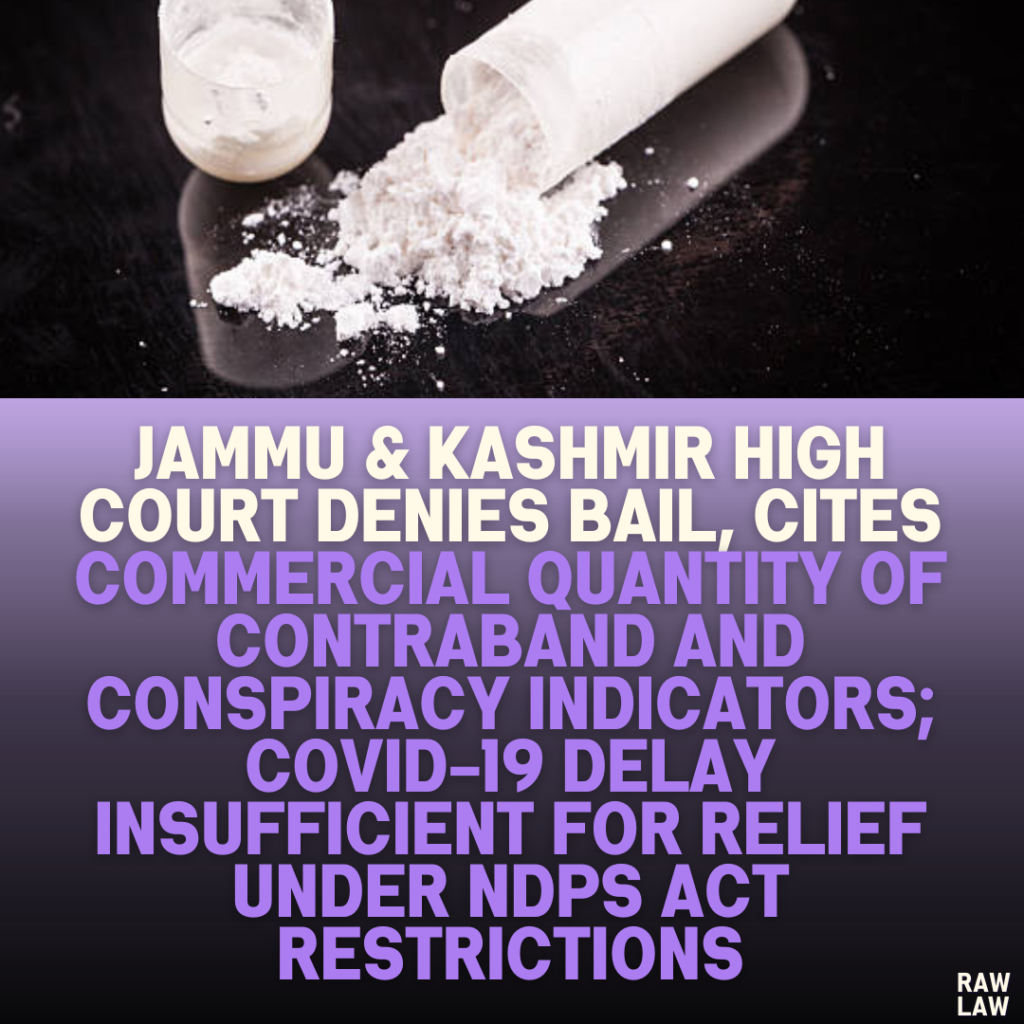Court’s Decision:
The Jammu & Kashmir High Court dismissed the bail application under Section 439 of the CrPC, citing the statutory restrictions under Section 37 of the Narcotic Drugs and Psychotropic Substances Act (NDPS Act) due to the alleged recovery of a commercial quantity of contraband from the petitioner and co-accused. The court emphasized that unless specific conditions are satisfied, particularly the reasonable grounds for innocence and likelihood of non-recurrence, bail cannot be granted under the NDPS Act.
Facts:
The petitioner was arrested along with co-accused in a vehicle where contraband drugs, including Tramadol and Tapentadol capsules, were allegedly found in their possession. The drugs were reportedly distributed among the accused, and police subsequently charged them under Sections 8, 21, 22, and 29 of the NDPS Act. The case has been ongoing in the Additional Sessions Court, Jammu, where the petitioner sought bail, citing prolonged incarceration and inconsistent witness testimonies as grounds.
Issues:
The primary issues before the court were:
- Whether the petitioner, given the prolonged duration of custody, should be granted bail despite the bar under Section 37 of the NDPS Act.
- Whether the evidence provided reasonable grounds for the court to believe the petitioner was not guilty of the alleged offense.
- The implication of co-accused being granted bail on medical grounds on the petitioner’s request for parity.
Petitioner’s Arguments:
The petitioner argued for bail based on:
- Long duration of incarceration exceeding four years without conclusion of trial.
- Alleged inconsistencies in the testimonies of prosecution witnesses.
- The claim that the quantity of drugs in his possession did not fall under “commercial quantity,” hence challenging the applicability of Section 37.
- Two co-accused being granted bail on medical grounds, suggesting parity in treatment.
Respondent’s Arguments:
The respondent opposed the bail application, invoking Section 37 of the NDPS Act and underscoring that the total quantity of contraband drugs recovered from all accused together qualifies as commercial quantity, thus triggering the bar on bail. They further argued that the delay in trial was largely due to the pandemic and not the prosecution’s fault.
Analysis of the Law:
The court examined the stringent requirements under Section 37 of the NDPS Act for granting bail in cases involving commercial quantities. It highlighted precedents from the Supreme Court, particularly the rulings in Union of India vs. Ram Samujh and State of Kerala vs. Rajesh, where the necessity of “reasonable grounds” for innocence was emphasized as a crucial precondition for bail.
Precedent Analysis:
The court referred to several Supreme Court judgments, including:
- Union of India vs. Ram Samujh, which underscored the strict interpretation of bail provisions under the NDPS Act due to the social hazards posed by narcotics trafficking.
- State of Kerala vs. Rajesh, defining “reasonable grounds” as requiring more than prima facie evidence, instead necessitating substantial probable causes for innocence.
Court’s Reasoning:
The court noted that the petitioner, along with co-accused, was traveling in the same vehicle at the time of the arrest, with each having a significant quantity of contraband in their possession, which collectively qualified as commercial. The court reasoned that this joint travel and possession indicated a conspiracy, thereby implicating the petitioner under Section 29 of the NDPS Act. Additionally, the court did not find any substantial contradictions in the prosecution’s witness statements, undermining the petitioner’s argument of inconsistencies.
The court also held that the delay in trial, largely attributed to COVID-19 restrictions, did not justify bail, as the prosecution had presented witnesses regularly, with only one witness remaining.
Conclusion:
The court dismissed the bail application, concluding that the petitioner failed to meet the criteria under Section 37 of the NDPS Act, particularly the demonstration of reasonable grounds of innocence. The petitioner’s prolonged custody and alleged witness inconsistencies did not satisfy the stringent requirements for bail.
Implications:
This judgment reiterates the NDPS Act’s stringent conditions for granting bail in cases involving commercial quantities of contraband, emphasizing the court’s obligation to prioritize public interest over individual liberty in such instances. The case also clarifies the limited circumstances under which prolonged incarceration may justify bail when public health and societal interests are at stake. The directive to expedite trial proceedings within two months reinforces judicial accountability while balancing statutory mandates with constitutional rights.



